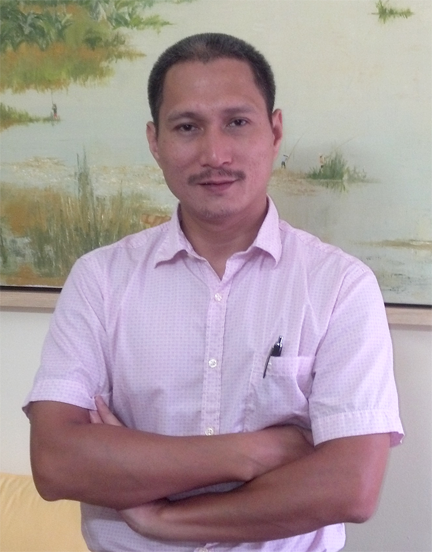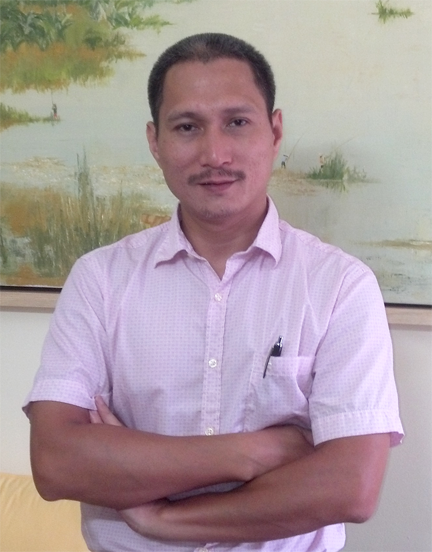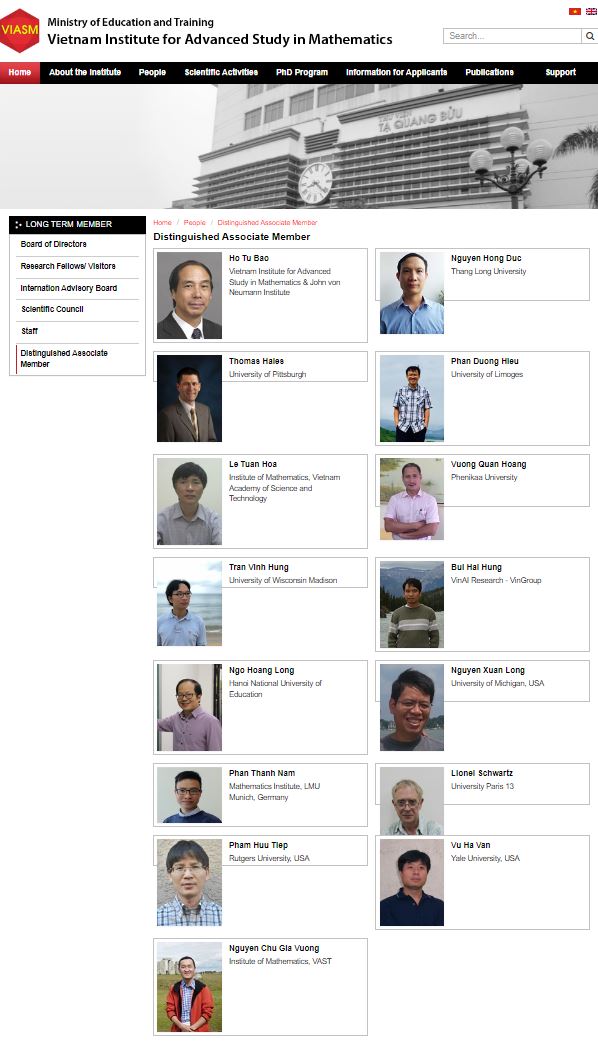- social sciences
- interdisciplinary research
- philosophy of science
Basic Information

(Feb 1972–)
Location: Hanoi
1. Career
Dr. Vuong Quan Hoang (who will be identified as “Vuong” throughout this biography piece) is one of the most important figures in contemporary Vietnamese social sciences and humanities, especially after 2000. In the early 2000s, his publications focused on applied econometrics and probability, with some examples being [1][2][3][4]. Study [1] was the first academic paper to report anomalies and herd behavior in Vietnam’s newborn stock market, just four years after its inception, and [3] has for more than a decade now become a key reference for practitioners and academic research in assessing and building credit risk evaluation models for Vietnamese banks’ individual and corporate customers.
Vuong is currently the director of Centre for Interdisciplinary Social Research (Phenikaa University, Hanoi, Vietnam) and the Founding Chair of Vietnam Chapter of the European Association of Science Editors. Besides, he is also affiliated with the Centre Emile Bernheim de Recherche Interdisciplinaire en Gestion (CEBRIG, Université Libre de Bruxelles), in which he obtained the PhD degree in 2004. He serves as a Distinguished Associate Member with Vietnam Institute for Advanced Study in Mathematics (VIASM) during 2021-2024. His other notable positions include:
- Member of five journals’ editorial boards: Humanities & Social Sciences Communications (formerly, Palgrave Communications of Nature), Scientific Data (Nature Publishing Group), Springer Nature Social Sciences (Springer Nature), Journal of Risk and Financial Management (MDPI), and European Science Editing (European Association of Science Editors).
- Member of Scientific Council on Basic Research in the Social Sciences and Humanities (Economics Section), the National Foundation for Science and Technology Development (NAFOSTED), Vietnam Ministry of Science and Technology (from 2018 to present).
- Member of the Scientific Committee of Phenikaa University (from 2019 to present).
- Member of the Hanoi Stock Exchange (HNX) Index Committee (from 2012 to 2016).

2. Projects and Awards
Since 1997, Vuong has contributed to hundreds of works and projects. His most remarkable projects and awards can be listed as follows:
- In 2009, he co-authored with Prof. Phạm Minh Chính (Vietnam Prime Minister from 2021) to write a history book about Vietnamese economy. The book was titled “Kinh tế Việt Nam: Thăng trầm và đột phá” and published by the National Political Publishing House [5][6].
- In 2018, he initiated and led the SSHPA project, comprising the first Vietnamese national database on social sciences and humanities and the first Vietnamese science communication website [7]. The project was funded by NAFOSTED during 2018-2021.
- In 2019, he collaborated with Professor Ngô Bảo Châu (Fields Medalist – Leader of VIASM & Math Professor at University of Chicago) to start the SciMath project – the first national database of Vietnam mathematics. The database records the 80-year development of Vietnam mathematical research [8][9][10]. Since 2021, he has been invited to be a Distinguished Associate Member with VIASM to continue developing the database.
- From 2017 to 2022, he has had 15 pieces of research and opinions published in Nature journals [7][11][12][13][14][15][16][17][18][19][20][21][22][23][24].
- Based on his genuine contemplation of humanistic values and wisdom in life, he wrote a collection of short stories that is titled “Ngụ ngôn bói cá” [The Kingfisher story collection] [25].
- In 2017, he collaborated with Mr. La Viet-Phuong to develop the bayesvl R package – an open Bayesian modeling and analysis software package. They officially published the software in The Comprehensive R Archive Network (CRAN) on 18th May 2019 [26][27][28]. The package was introduced in various news outlets.
- He is awarded the Distinguished Scientist title by Phenikaa University (ranked first in Vietnam according to Nature Index 2021).
- He has received multiple Research Excellence Awards from affiliated universities: Phenikaa University (2018-2020), Thanh Tay University (2017), and FPT University (2016-2017).
- He was the recipient of the Vietnam National Journalism Prize 2010 and Vietnam National Books Prize 2007.
3. Scientific Contributions
Since 1997, Vuong has contributed to more than 180 academic publications that were published by 88 journals of various publishers in multiple disciplines. To mention a few, BMC, Brill, Cell Press, De Gruyter, Dove Press, Elsevier, Emerald, Inderscience, MDPI, MIT Press, The National Bureau of Asian Research, Nature, Oxford University Press, Palgrave Macmillan, Praeger, Springer, Taylor & Francis, University of Warwick Press, Wiley, World Scientific, etc. Among his publications, there are 12 works published by Nature outlets: Nature, Humanities and Social Sciences Communications, Nature Human Behaviour, Scientific Data, etc.
Apart from scientific articles, he has also edited and co-edited 15 books about different issues, such as mindsponge theory [29], scientific methods [30][31], innovation [32], psychology [33], academic publishing [34], entrepreneurship [35][36], economics [5][37], education [38][39], finance [40], mathematics [41][42], and sustainability [37]. Notably, he co-authored with Phạm Minh Chính (Vietnam Prime Minister from 2021) to write a history book about the Vietnamese economy. His books are held by many libraries in the United States (US), United Kingdom (UK), France, Germany, Netherlands, Sweden, Canada, Norway, Japan, China, Vietnam, etc. To mention a few, US Library of Congress, Yale University Library, Cornell University Library, Harvard University - Harvard-Yenching Library, National Library of Australia, The British Library, Temple University Libraries, Flinders University Library, Staatsbibliothek Zu Berlin - Preussischer Kulturbesitz Berlin State Library, UC Berkeley Libraries, Arizona State University Library, etc.
He has also contributed to science under the roles of an editor and reviewer. As an editor, he has provided editorial services to 85 manuscripts for journals indexed by Web of Science (WoS). As a reviewer, he has completed more than 200 peer-review reports for 75 academic journals. He was awarded Top reviewers in Cross-Field in 2018 and 2019.
His analyses and opinions have been communicated in both international (e.g. AFP, AseanAffairs, ETF Trend, Forbes, La Reppublica, Los Angeles Times, New York Times, Roubini Global Economics, Stratfor, Sina.com, VOA, Wall Street Journal, etc.) and Vietnamese media (Khoa học & Phát triển, Kinh tế và Dự báo, Nhân Dân, Saigon Economic Times, Tiền Phong, Thanh Niên, Tuổi Trẻ, Vietnam Economic Times, VietnamNet, etc.).
4. Contribution to Open Science
Vuong’s scientific endeavors follow his philosophy of open science in three major aspects: the cost of doing science [13], disciplined and proactive attitude [16], and transparency [20]. These philosophies are deeply intertwined in his thoughts and can be observed through his main projects and proposals.
Science is facing some obstacles, such as the reproducibility crisis, costly publishing system, scientific misconducts, etc.[43][44][45][46][47][48] .These problems, in turn, urge for changes (albeit gradually) toward open science, which can help verify claimed results, data quality, and methodological validity. In addition to open data, an open review process and open community dialogue (codes and other technical aspects) are also beneficial [12]. Therefore, every step of publishing should be transparent, including retraction – as Vuong advocates for comprehensive and open retraction notices from editors, self-retraction “heroic act” from authors, as well as an open section about limitations of the study [49][50][51].
Furthermore, he and his colleague also propose the right to refuse unwanted citations for the sake of integrity [52][53]. Vuong suggests that preprints should be appreciated more for their usefulness, the preservation of original thinking, and last but not least – for being a very fast and economical publishing process [54][55].
Against the inappropriate old ways of thinking and ethics violations in academia [56], Vuong stated that it requires a disciplined and proactive attitude to overcome systematic risks [13][16]. Following his philosophy, Vuong and his team published the first open Vietnamese social sciences and humanities database in Scientific Data [7]. He and his team also made the bayesvl – an open Bayesian analysis R package – and published the open accessed usage protocols afterwards [26].
5. Theoretical Frameworks and Concepts
Since his first publication in 1997, Vuong has proposed five notable theoretical frameworks and concepts:
- Serendipity as a strategic advantage [57]
- 3D information process of creativity [58]
- Mindsponge theory [29][59][60][61]
- Cultural additivity [15][62]
- Semi-conducting principle [63][64]
- Nature, emergence, and mechanism of serendipity [32][65]
These frameworks and concepts have helped advance scientific knowledge and understanding in various research fields, with many applications across business and management, environmental conservation, psychology and public health, socio-cultural studies, etc.
References
- Farber A, Vuong QH. (2004). New empirical results on anomalies and herd behavior: Vietnam stock market 2000-2004. Economic Studies, 44(9), 55-59
- Nguyen VH, Vuong QH, Tran MN. (2005). Central limit theorem for functional of jump Markov processes. Vietnam Journal of Mathematics, 33(4), 443-461.
- Hoàng VQ, et al. (2006). Phương pháp thống kê xây dựng mô hình định mức tín nhiệm khách hàng thể nhân. Vietnam Journal of Mathematical Applications, 4(2), 1-16.
- Nguyen VH, Vuong QH. (2007). On the martingale representation theorem and on approximate hedging a contingent claim in the minimum deviation square criterion. In: Some Topics in Industrial and Applied Mathematics (pp. 134-151). Singapore: World Scientific.
- Chính PM, Hoàng VQ. (2009). Kinh tế Việt Nam: Thăng trầm và đột phá. Nxb Chính trị Quốc gia, Hà Nội.
- Le TT. (2021). ベトナム新首相と新時代のチャレンジ. OSF Preprints. https://doi.org/10.31219/osf.io/rtpf5
- Vuong QH, La VP, Vuong TT, Ho MT, Nguyen THK, Nguyen VH, Pham HH, Ho MT. (2018). An open database of productivity in Vietnam's social sciences and humanities for public use. Scientific Data, 5, 180188. Retrieved from: https://www.nature.com/articles/sdata2018188
- Ngo BC, Vuong QH, La VP, Le TH, Le MH, Trinh TTG, Pham HH, Nguyen TTH, Nguyen TD, Nguyen TL, Tran T, Nguyen MH, Ho MT. (2020). The 80-year development of Vietnam mathematical research: Preliminary insights from the SciMath database on mathematicians, their works and their networks. arXiv. https://arxiv.org/abs/2011.09328
- Le TT, Nguyen TTH. (2021). SciMathデータベースプロジェクト:ベトナム数学の八十年間. OSF Preprints. https://doi.org/10.31219/osf.io/kmfwq
- Nguyen TTH, Le TT, Dong MH. (2021). 越南统计数据库的八十年通过 Scimath 项目. OSF Preprints. https://doi.org/10.31219/osf.io/7y86n.
- Vuong QH. (2017). Survey data on Vietnamese propensity to attend periodic general health examinations. Scientific Data, 4, 170142. Retrieved from: https://www.nature.com/articles/sdata2017142
- Vuong QH. (2017). Open data, open review and open dialogue in making social sciences plausible. Nature: Scientific Data Updates. Retrieved from: https://go.nature.com/2QdnUrW.
- Vuong QH. (2018). The (ir)rational consideration of the cost of science in transition economies. Nature Human Behaviour, 2(1),5. Retrieved from: https://www.nature.com/articles/s41562-017-0281-4
- Vuong QH, Ho MT, Nguyen THK, Vuong TT. (2018). Healthcare consumers’ sensitivity to costs: a reflection on behavioural economics from an emerging market. Palgrave Communications, 4, 70. Retrieved from:https://www.nature.com/articles/s41599-018-0127-3
- Vuong QH, Bui QK, La VP, Vuong TT, Nguyen VH, Ho MT, Nguyen THK, Ho MT. (2018). Cultural additivity: Behavioural insights from the interaction of Confucianism, Buddhism, and Taoism in folktales. Palgrave Communications, 4,143. Retrieved from: https://www.nature.com/articles/s41599-018-0189-2
- Vuong QH. (2019). Breaking barriers in publishing demands a proactive attitude. Nature Human Behaviour, 3(10), 1034. Retrieved from: https://www.nature.com/articles/s41562-019-0667-6
- Vuong QH, Ho MT, Nguyen THK, Nguyen MH. (2019). The trilemma of sustainable industrial growth: Evidence from a piloting OECD’s Green city. Palgrave Communications, 5, 156. Retrieved from: https://www.nature.com/articles/s41599-019-0369-8
- Vuong QH, La VP, Vuong TT, Ho MT. (2020). Earth Hour in Vietnam: a perspective from the electricity industry. Nature: Behavioural & Social Sciences. Retrieved from: https://go.nature.com/3eGzl6Y
- Vuong QH, Nguyen THK, Ho MT, La VP, Vuong TT, Tran T, Hoang KL, Vu TH, Hoang PH, Nguyen MH, Ho MT. (2020). On how religions could accidentally incite lies and violence: Folktales as a cultural transmitter. Palgrave Communications, 6, 82. Retrieved from: https://www.nature.com/articles/s41599-020-0442-3
- Vuong QH. (2020). Reform retractions to make them more transparent. Nature, 582(7811), 149. Retrieved from: https://www.nature.com/articles/d41586-020-01694-x
- Vuong QH, Nguyen TTH, Pham TH, Ho MT, Nguyen MH. (2021). Assessing the ideological homogeneity inentrepreneurial finance research by highly cited publications. Humanities and Social Sciences Communications, 8, 110. Retrieved from: https://www.nature.com/articles/s41599-021-00788-9
- Vuong QH, et al. (2022). Covid-19 vaccines production and societal immunization under the serendipity-mindsponge3D knowledge management theory and conceptual framework. Humanities and Social Sciences Communications, 9, 22. https://www.nature.com/articles/s41599-022-01034-6
- Ho MT, Mantello P, Nguyen HKT, Vuong QH. (2021). Affective computing scholarship and the rise of China: A bibliometric analysis of the period 1995-2020. Humanities and Social Sciences Communications, 8, 282. Retrieved from: https://www.nature.com/articles/s41599-021-00959-8
- Ho MT, Nguyen HTT, Nguyen MH, La VP, Vuong QH. (2022). Virtual Tree, Real Impact: How Simulated Worlds Associate with the Perception of Limited Resources. Humanities and Social Sciences Communications, 9, 213. Retrieved from: https://www.nature.com/articles/s41599-022-01225-1
- Quan-Hoang Vuong. (2022). The Kingfisher Story Collection. https://books.google.com/books?id=ne-KEAAAQBAJ
- Vuong QH, La VP, Nguyen MH, Ho MT, Tran T, Ho MT. (2020). Bayesian analysis for social data: A step-by-step protocol and interpretation. MethodsX, 7, 100924. https://doi.org/10.1016/j.mex.2020.100924
- Vuong QH, La VP, Nguyen MH, Ho MT, Ho MT, Mantello P. (2020). Improving Bayesian statistics understanding in the age of Big Data with the bayesvl R package. Software Impacts, 4, 100016. https://doi.org/10.1016/j.simpa.2020.100016
- La VP, Vuong QH. (2019). bayesvl: Visually learning the graphical structure of Bayesian networks and performing MCMC with ‘Stan’. The Comprehensive R Archive Network (CRAN). Retrieved from: https://cran.rstudio.com/web/packages/bayesvl/index.html
- Vuong QH. (2022). Mindsponge Theory. AISDL. https://books.google.com/books?id=OSiGEAAAQBAJ
- Vuong QH, Nguyen MH, La VP. (2022). The mindsponge and BMF analytics for innovative thinking in social sciences and humanities. Berlin, Germany: De Gruyter. ISBN (PDF): 978-83-67405-11-9; ISBN (hardcover): 978-83-67405-10-2. doi:10.2478/9788367405119
- Hoàng VQ, Phương LV, Trung T, Hoàng NM, Toàn HM. (2021). Bản hòa tấu dữ liệu xã hội. Nxb Khoa học Xã hội, Hà Nội. ISBN: 978-604-308-549-5.
- Vuong QH. (2022). A New Theory of Serendipity: Nature, Emergence and Mechanism. Berlin, Germany: De Gruyter GmbH. ISBN-13: 9788366675865. doi:10.2478/9788366675865
- Hữu NV, Hoàng VQ. (2007) Các phương pháp toán học trong tài chính. NXB Đại học Quốc gia Hà Nội, Hà Nội: Việt Nam. http://books.google.com.vn/books?id=CVHkAY-PIZMC.
- Vuong QH, Nguyen MH, Le TT. (2021). A mindsponge-based investigation into the psycho-religious mechanism behind suicide attacks. Warsaw, Poland: De Gruyter / Sciendo. ISBN: 9788366675582
- Vuong QH, Tran T. (2019). The Vietnamese Social Sciences at a Fork in the Road. Warsaw, Poland: De Gruyter (Edition: Sciendo). https://doi.org/10.2478/9783110686081
- Vuong QH. (2020). Entrepreneurial Finance at the Dawn of Industry 4.0. Basel, Switzerland: MDPI AG.https://doi.org/10.3390/books978-3-03943-598-2
- Hoàng VQ. (2007). Văn minh làm giàu & Nguồn gốc của cải. NXB Chính trị Quốc gia. Hà Nội: Việt Nam.http://books.google.com.vn/books?id=El4zVl36thsC
- Chiến BN, Hoàng VQ. (2015). Bằng chứng cuộc sống: suy ngẫm về phát triển bền vững Việt Nam. NXB Chính trị Quốc gia, Hà Nội: Việt Nam.
- Nancy KN, Vuong QH. (2013). What we see, why we worry, why we hope: Vietnam going forward. Boise, ID: Boise State University CCI Press.
- Vuong QH, Vinh LA, Tran T. (2021). Academic Contributions to the UNESCO 2019 Forum on Education for Sustainable Development and Global Citizenship. MDPI AG, Basel. https://doi.org/10.3390/books978-3-0365-0681-4
- Vuong QH. (2010). Financial Markets in Vietnam's Transition Economy: Facts, Insights, Implications. VDM-Verlag, 66123 Saarbrücken, Germany
- Hoàng VQ, Chí NP. (2000). Nguyên lý tài chính-toán của thị trường chứng khoán. NXB Chính trị quốc gia, Hà Nội: Việt Nam. https://books.google.com.vn/books?id=t-V6HpkdUTMC
- Van Noorden R. (2013). Open access: The true cost of science publishing. Nature, 495(7442), 426-429.https://doi.org/10.1038/495426a
- Vuong QH. (2020). Plan S, self‐publishing, and addressing unreasonable risks of society publishing. LearnedPublishing, 33(1), 64-68. https://doi.org/10.1002/leap.1274
- Munafò M. (2016). Open science and research reproducibility. ecancermedicalscience, 10.https://doi.org/10.3332/ecancer.2016.ed56
- Open Science Collaboration. (2015). Estimating the reproducibility of psychological science. Science, 349, 6251. https://doi.org/10.1126/science.aac4716
- Fidler F, Wilcox J. (2018). Reproducibility of scientific results. The Stanford Encyclopedia of Philosophy. Retrieved from: https://plato.stanford.edu/entries/scientific-reproducibility/
- 胡孟全, 同明玄. (2021). 研究领域执着的执着. OSF Preprints. doi: osf.io/b7mqt.
- Teixeira da Silva JA, Vuong QH. (2021) Fortification of retraction notices to improve their transparency and usefulness. Learned Publishing, Early view. https://doi.org/10.1002/leap.1409
- Vuong QH, La VP, Ho MT, Vuong TT, Ho MT. (2020). Characteristics of retracted articles based on retraction data from online sources through February 2019. Science Editing, 7(1), 34-44. https://doi.org/10.6087/kcse.187
- Vuong QH. (2020). The limitations of retraction notices and the heroic acts of authors who correct the scholarly record: An analysis of retractions of papers published from 1975 to 2019. Learned Publishing, 33(2), 119-130. https://doi.org/10.1002/leap.1282
- Teixeira da Silva JA, Vuong QH. (2021). The right to refuse unwanted citations: rethinking the culture of science around the citation. Scientometrics, 126, 5355–5360. https://doi.org/10.1007/s11192-021-03960-9
- Le TT. (2021). 引用されることを拒否する権. OSF Preprints. https://doi.org/10.31219/osf.io/qxztm
- Vuong QH. (2018). Do not underestimate the value of preprints in the social sciences and humanities just because they are un-peer-reviewed. SSRN Electronic Journal. http://dx.doi.org/10.2139/ssrn.3457968
- Vuong QH. (2020). The rise of preprints and their value in social sciences and humanities. Science Editing, 7(1), 70-72. https://doi.org/10.6087/kcse.193
- Vuong QH. (2018). “How did researchers get it so wrong?” The acute problem of plagiarism in Vietnamese social sciences and humanities. European Science Editing, 44(3), 56-58. Retrieved from: http://europeanscienceediting.org.uk/articles/how-did-researchers-get-it-so-wrong-the-acute-problem-of-plagiarism-invietnamese-social-sciences-and-humanities/
- Napier NK, Vuong QH. (2013). Serendipity as a strategic advantage?. In Wilkinson (ed) Strategic Management in the 21st Century (Vol. 1: The Operational Environment), pp. 175-199. Westport, CT: Praeger/ABC-Clio. https://doi.org/10.13140/2.1.3311.9523
- Vuong QH, Napier NK. (2015). Making creativity: the value of multiple filters in the innovation process. International Journal of Transitions and Innovation Systems, 3(4), 294. https://doi.org/10.1504/IJTIS.2014.068306
- Vuong QH. (2016). Global mindset as the integration of emerging socio-cultural values through mindsponge processes: A transition economy perspective. In J. Kuada (Ed.), Global Mindsets: Exploration and Perspectives (pp. 123-140). New York: Routledge.
- Vuong QH, Napier NK. (2015). Acculturation and global mindsponge: An emerging market perspective. International Journal of Intercultural Relations, 49, 354-367. https://doi.org/10.1016/j.ijintrel.2015.06.003
- 阮明皇, 胡孟全. (2021). 关于Mindsponge*bayesvl 方法的价值研究人文和社会科学现象. OSF Preprints.doi:10.31219/osf.io/rz462.
- Le TT. (2021). ベトナムからの人文社会科学メイン論文三本. OSF Preprints. https://doi.org/10.31219/osf.io/g98xw
- Vuong QH. (2021). The semiconducting principle of monetary and environmental values exchange. Economics and Business Letters 10(3), 284-290. https://doi.org/10.17811/ebl.10.3.2021.284-290
- Casual Philosophy. (2022). The Top 10 Philosophy Papers Published in 2021. Mindsponge.info. Retrieved from: https://mindsponge.info/posts/52
- The Holy Grail. (2022). Review of A New Theory of Serendipity on Online Book Club. Mindsponge.info. Retrieved from: https://mindsponge.info/posts/53
- Le TT. (2021). ベトナムからの人文社会科学メイン論文三本. OSF Preprints. https://doi.org/10.31219/osf.io/g98xw
- Vuong QH. (2021). The semiconducting principle of monetary and environmental values exchange. Economics and Business Letters 10(3), 284-290. https://doi.org/10.17811/ebl.10.3.2021.284-290
- Casual Philosophy. (2022). The Top 10 Philosophy Papers Published in 2021. Mindsponge.info. Retrieved from: https://mindsponge.info/posts/52
- The Holy Grail. (2022). Review of A New Theory of Serendipity on Online Book Club. Mindsponge.info. Retrieved from: https://mindsponge.info/posts/53
- Quan-Hoang Vuong. (2022). The Kingfisher Story Collection. https://books.google.com/books?id=ne-KEAAAQBAJ

